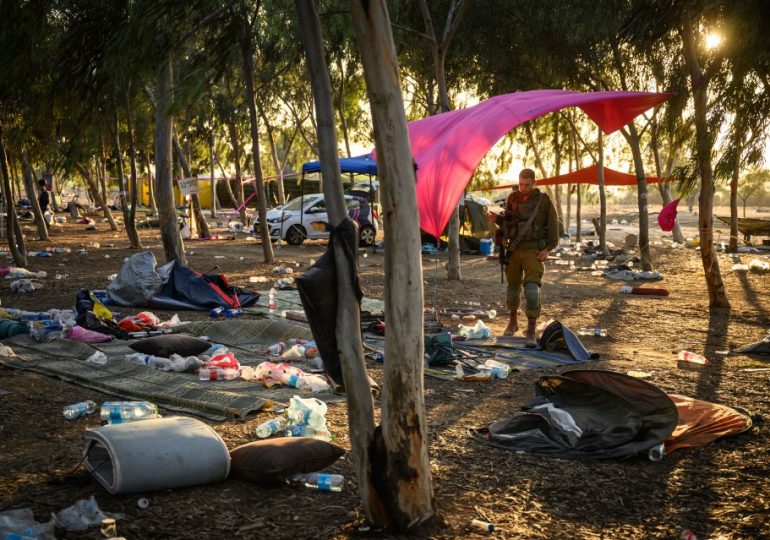ISRAEL is preparing for its female hostages to return home pregnant after potentially being raped while in Hamas captivity.
Sunday marked 100 days since the terror group’s brutal attack on October 7 and the beginning of a fresh war between Hamas and Israel.
GettyAn Israeli soldier surveys the destruction at the Supernova festival site after the October 7 attacks[/caption]
EPAA man fixes a picture of an Israeli hostage held in Gaza[/caption]
GettyThe war between Israel and Hamas hit its 100th day on Sunday as battles continue in the Gaza Strip – pictured: an explosion in Gaza on January 5[/caption]
Harrowing accounts of sexual assault have been reported in the last three months, sparking fears in Israel that female hostages could return home pregnant by rape in captivity.
The Israeli medical community has told media outlets they are preparing for the worst, with conversations in hospitals taking place about how they can support any women in that position.
While Israeli laws permit women to get abortions – medical professionals are focused on the trauma that hostages in that position will have suffered through.
There are believed to still be over 130 hostages still in the Gaza Strip.
Testimonies from some of the women who have already been released tell stories of sexual harassment – and possibly rape – while kept by Hamas.
Gynaecologists in Israel have been discussing in recent weeks about how they can support any who now return home pregnant – with considerations about how far along in a pregnancy they could be.
They have also discussed health risks to the women amid conditions of poor hygiene in the war-torn Strip – as pregnancy compromises a woman’s immune system.
And there are concerns around what the lack of medical intervention early on in any potential pregnancies could mean.
Professor Tal Biron-Shental, director of the Obstetrics and Gynecology division at Meir Medical Center in Kfar Saba, told The Jersualem Post:
“The human brain struggles to comprehend the situation of a captive in captivity who must deal not only with the pregnancy but also with the fact that it was conceived through the brutal rape by a murderous terrorist.
“Performing an abortion is a procedure we are all familiar with and skilled in. However, the primary challenge the state must now address is the horrific and daunting psychological trauma.
“A pregnant woman, feeling fetal movements and with a visibly growing belly, naturally attaches to the fetus.”
And Professor Hagai Levine, chairman of Israel’s Association of Public Health Physicians, said: “The task of terminating an advanced pregnancy becomes increasingly complex and challenging as the days in captivity progress.
“Stress, polluted environments, and the absence of medical supervision amplify the complications and dangers of pregnancy for the mother, even before considering the appalling psychological aspect.
“We have been pressing for a long time with requests to allow medical examinations and the transfer of medications.
“If there is a captive woman who, God forbid, has conceived from rape, it is imperative to bring her home urgently.”
Yoni Saadon, a dad-of-four, previously told the Sunday Times about how he watched on in horror as Hamas thugs raped a woman “with the face of an angel”.
He was hiding under the stage at the Supernova desert rave on October 7, where Hamas unleashed fire, killing and kidnapping revellers.
He said: “I saw this beautiful woman with the face of an angel and eight or ten of the fighters beating and raping her.
“She was screaming, ‘Stop it — I’m going to die anyway from what you are doing, just kill me!’
“When they finished they were laughing and the last one shot her in the head.
“I kept thinking it could have been one of my daughters.”
And Saadon is not the only one to report sexual crimes committed by Hamas.
Other media outlets have reported sexual assaults, including from twisted videos taken by Hamas and released by Israel.
Multiple first-person accounts of rape have also surfaced in recent months.
The BBC previously reported that Israel showed reporters an appalling video detailing one woman’s account of witnessing sexual assault.
The woman, known as Witness S, told how Hamas passed a female partygoer from one attacker to another.
Then she said: “She was alive. She was bleeding from her back. They sliced her breast and threw it on the street. They were playing with it.”
Witness S then told how the victim was passed to another man in uniform, who shot her in the head while he was raping her.
The BBC also quoted a survivor from the Supernova festival who said: “Some women were raped before they were dead, some raped while injured, and some were already dead when the terrorists raped their lifeless bodies.
“I desperately wanted to help, but there was nothing I could do.”
And a morgue worker said: “There is evidence of mass rape so brutal that they broke their victims’ pelvis — women, grandmothers, children.”
Photographs from massacre sites show dead women naked from the waist down, or with their underwear ripped to one side, their legs splayed and with signs of trauma to their genitals and legs.
As the war hit its 100th day on Sunday, families in Israel were tormented with a video of hostages released by Hamas.
Hamas released footage of Noa Argamani, 26 as well as hostages Yossi Sharabi, 53, and Itai Svirsky, 38.
In edited-together clips, the trio identify themselves and ask the Israeli government to return them home.
It is unclear when the clips were filmed but it is the first sign the trio could still be alive following 100 days of captivity inside Gaza.
Noa and her boyfriend were among 40 festival goers taken hostage near kibbutz Re’im.
Hamas and other Gaza militants captured some 250 people and slaughtered 1,200 others during its deadly attack on southern Israel.
More than 100 hostages were released during a temporary truce in November, but over 130 remain held in Gaza.
The IDF released a huge amount of data on the war on Sunday, detailing its operations so far in the Gaza Strip.
It said over 9,000 Hamas terrorists had been killed since October 7, along with around 1,000 terrorists inside Israel.
Meanwhile the Hamas-run health ministry in Gaza has said that over 23,000 Palestinian civilians have died during the war.
Israel disputes these figures, while US President Joe Biden previously said he had “no confidence” in them.
But Israeli Prime Minister Benjamin Netanyahu has admitted that Israel has “not been successful” in reducing civilian casualties.
Israel has faced repeated international calls to relent in it’s attacks on Gaza as it tries to obliterate Hamas.
Calls from the UN for a ceasefire have been echoed by religious leaders including the Pope and even it’s staunchest ally, the US, has warned caution.
But Israeli forces said that months of fighting lie ahead as they attempt to track down and eliminate the terrorists behind the October massacre.
Israeli soldiers look at photos of people killed and taken captive by Hamas militants during their attack on the Supernova desert raveAP
AFPA Hamas terrorist at the festival site during the October 7 attacks[/caption]
GettyA destroyed refugee camp in Gaza, December 2023[/caption]
Leave a comment








